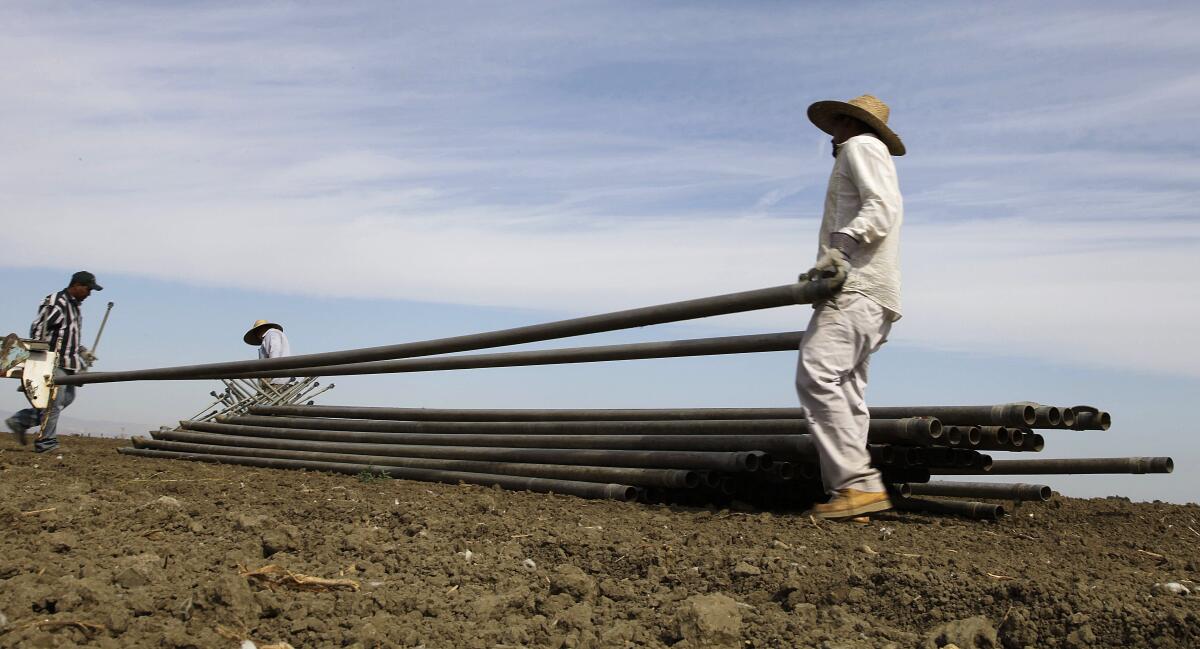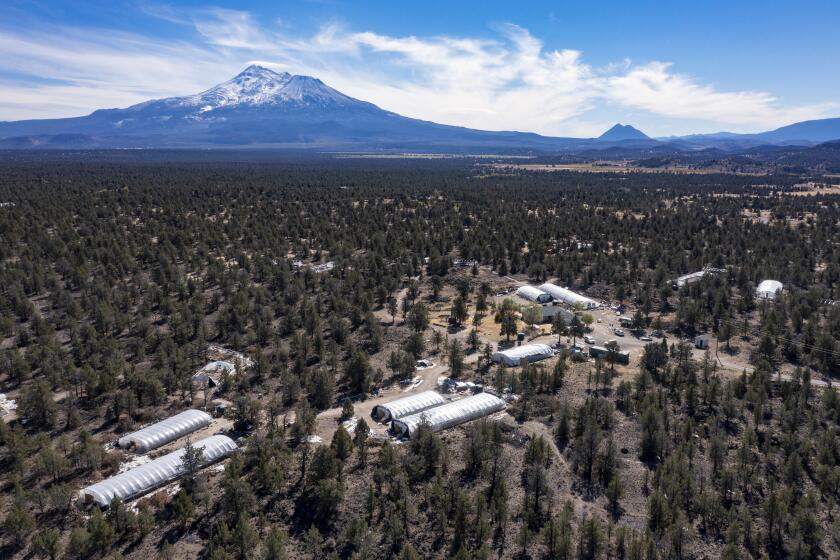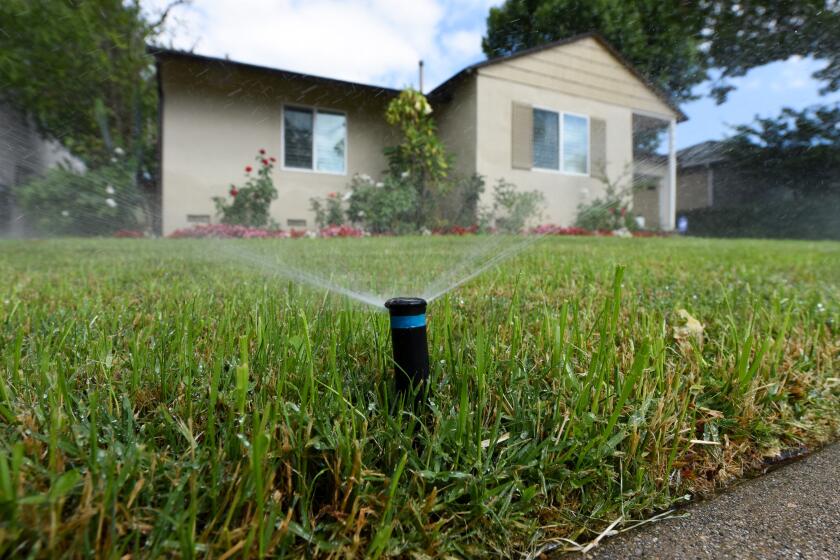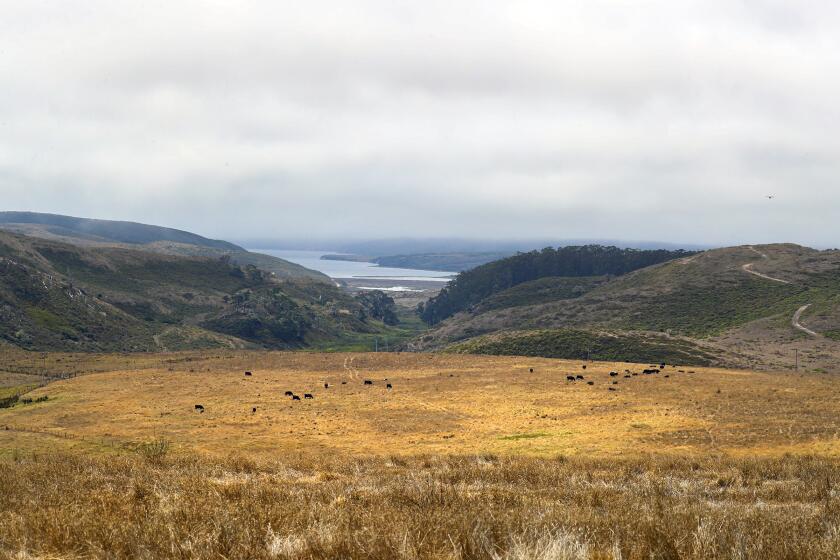Judge declines to validate water deal for California farm supplier

- Share via
A California judge has declined to validate a contract granting permanent access to federally controlled water for the nation’s largest agricultural water supplier, a move that means the U.S. government is not bound by terms of the deal.
Environmentalists had blasted the contract between the U.S. Bureau of Reclamation and the Westlands Water District as a sweetheart arrangement designed to benefit corporate agricultural interests over environmental needs and taxpayers. It was crafted during the Trump administration under then-Interior Secretary David Bernhardt, a former lobbyist for Westlands, a public entity based in Fresno that supplies water to private farmers.
“This was an effort to basically steal public resources and put them into private pockets,” said Stephan Volker, an attorney for the Winnemem Wintu Tribe, the North Coast Rivers Alliance and several other groups.
Westlands is evaluating the court’s ruling and may appeal if the case is dismissed, spokesperson Shelley Cartwright said. The water district rejects claims that it received special treatment, with Cartwright saying it has “acted transparently” and followed the steps required by law.
Fresno County Superior Court Judge D. Tyler Tharpe declined Wednesday to validate the contract between Westlands and the federal Bureau of Reclamation. Though the federal government is not bound by the terms of the contract until it is validated, the two sides have already moved forward. Tharpe scheduled another hearing on Dec. 2 to weigh dismissing the case.
Vexed by the cultivation of black market marijuana, Siskiyou County authorities banned the transport of water to a largely Asian subdivision.
The water Westlands doles out to its agricultural customers comes from the Central Valley Project, a federally run network of dams, tunnels and canals that brings water from California’s wetter north to the farm-rich San Joaquin Valley and heavily populated Southern California.
The case raises questions about how much water major districts that serve corporate interests should be entitled to at the expense of Native American tribes and environmental interests that rely on certain water flows, said Patricia Schifferle of Pacific Advocates, a natural resources consulting firm.
“The argument really is: Are we going to allocate that much water to Westlands Water District without conditions?” she said.
The contract gives Westlands permanent access to 1.15 million acre-feet of water for irrigation and other purposes, though it doesn’t guarantee all of that water in drier years like the one California is now experiencing. Since 1988, Westlands has received its full annual allocation from the Central Valley Project only six times, according to the district’s website.
An acre foot is 325,851 gallons. An average household uses one-half to one acre-foot of water a year, according to the Water Education Foundation, meaning the contract gave Westlands access to enough water to serve up to 2.3 million households.
Gov. Newsom declared a statewide drought emergency Tuesday, as officials announced that Californians reduced water use an average of 5% in August.
Westlands has long operated on an interim contract basis, renewing its water deal with the federal government every two years. But a law passed at the end of the Obama administration allows contractors to convert those contracts into permanent ones, so long as they agree to pay back the federal government for the cost of the water infrastructure.
The permanent contracts have to be validated by a state court in order for the federal government to be bound by the terms. Tharpe is the second state judge to reject its validation.
The first judge said Westlands brought forward an incomplete contract that lacked key details including how much money the district would pay the government and when. Westlands also failed to provide appropriate notice to the public and left the contract open ended, potentially allowing for later changes not subject to public scrutiny or court approval, the judge ruled.
Westlands moved forward anyway, finalizing the contract in early 2020. The district again sought approval. But Tharpe said the district’s decision to move forward with a more detailed contract didn’t change the fact that it initially sought approval for something incomplete. In his ruling, he again declined to validate the contract.
Meanwhile, environmental groups and other opponents charge Westlands isn’t paying back all of what it owes the federal government for use of the water infrastructure. The Interior Department previously said Westlands owed the federal government $480 million. That was eventually reduced to about $210 million, which Cartwright said the district has “fully repaid.”
Another year of drought has water managers taking extraordinary measures to keep faucets flowing.
But opponents say Westlands owes significantly more money for projects designed to mitigate damage and restore habitats for fish and wildfire through the water system, including the chinook salmon. Under a 1992 law, Central Valley Project contractors owe a combined $400 million for environmental work, with much of that cost falling to Westlands as the largest contractor. Cartwright said that Westlands pays for restoration work.
Westlands says it is following the same process as other water districts for converting its contract and that it’s received no special treatment. “The suggestion that the permanent nature of the proposed Westlands repayment contract makes it an ‘unusually good deal’ is simply false,” the district wrote in a 2020 “fact sheet” about the contract.
Bureau of Reclamation spokesperson Mary Lee Knecht declined to comment because the issue still is being litigated.
More to Read
Sign up for Essential California
The most important California stories and recommendations in your inbox every morning.
You may occasionally receive promotional content from the Los Angeles Times.













